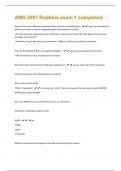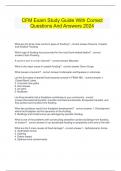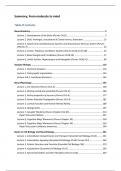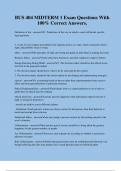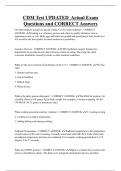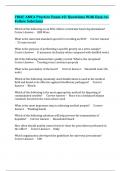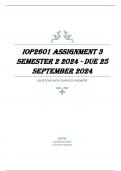Personality
Lecture Summary 2020
Lecture 1 - Introduction
Why this course?
There is a huge heterogeneity in antisocial behavior.
This can be seen in crimes and criminals and the types of behaviors as well as the individuals
who are acting can vary greatly.
Violent crimes are a brought spectrum of behaviors. The following are part of violent crimes:
- Injure victims (physically and psychologically)
- Spread fear through communities and are a burden to society
- Heterogeneity: low level aggression to premeditated violence (with different impacts on
the victims)
These violent crimes with different spectrums of severity are more often committed by one
particular group. These are individuals with people with mental disorders and pathology like
personality disorders. They are referred to as mentally disordered offenders.
Violence
Violence, for the purpose of this course, is defined as “a range of behaviors intended to harm a
living being who is motivated to avoid harm”.
This therefore excluded behavior that is accidental, consensual or harm that is ultimately
beneficial (in medical practices for example).
While violence is the forceful infliction of physical harm, aggression is less severe.
Aggression can be less physically harmful, but severely psychologically damaging. It can
1
,include threats and ignoring and therefore just as damaging or even more damaging as physical
violence. Additionally, it also leads to a lot of harm in society and communities.
For this course, we refer to both aggression and violence when we speak of violence and we
will focus on the individual characteristics of violence (not excluding other influences).
Rational: People differ in their proneness to violence
1. Individual differences (personality traits)
2. Personality processes (cognitive, emotional. etc.)
3. Personality disorders (problems with thoughts…)
Personality Disorder Definitions
DSM-5:
ICD-10:
Within the DSM-4, there are multiple axes.
Axis 1: Clinical Disorders
Axis 2: Personality Disorders (which are split in the following three clusters:)
Cluster A: Odd-eccentric (paranoid, schizoid and schizotypal PD)
Cluster B: Erratic-dramatic (antisocial, borderline, histrionic and narcissistic PD)
Cluster C: worried-anxious (avoidant, dependent and obsessive-compulsive PD)
2
,How to better understand the personality disorders:
Changes of the DSM-5
- Categorical (Section 2, same as DSM-iV) AND dimensional (Section 3 -
recommendation) perspective
- Section 3 (model for PD diagnosis and conceptualization)
- Multi-axial system disappeared
- Dimensional:
- PD = extreme variants of general personality traits, meaning all PD disorders
are defined by traits that are present in everyone to different degrees. At the extremes of
these traits there are impairments and we talk about personality disorders. We define
PDs in terms of severity instead of category
- Quantitative difference between normal and dysfunction
3
, 4


